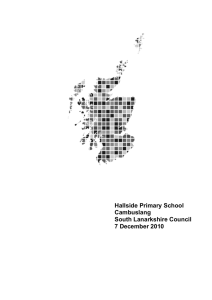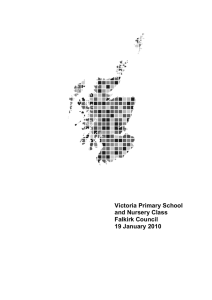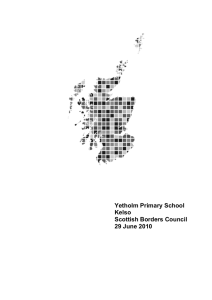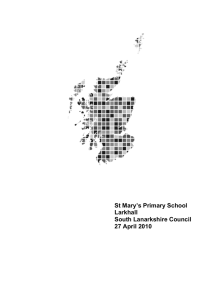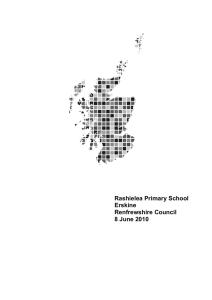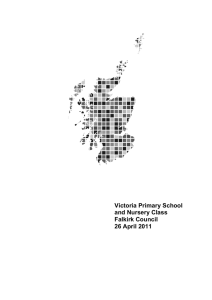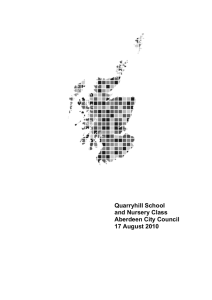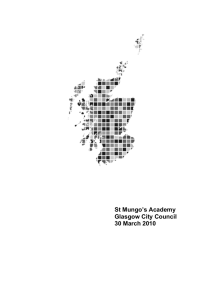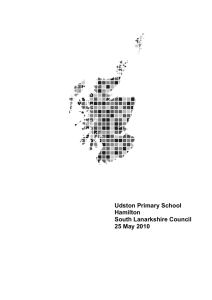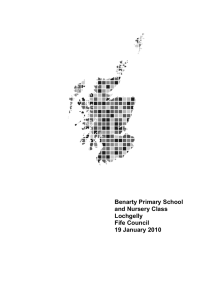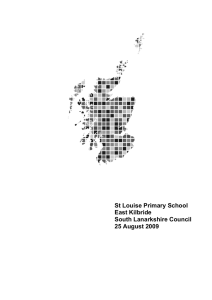Thorntree Primary School Shettleston Glasgow City Council
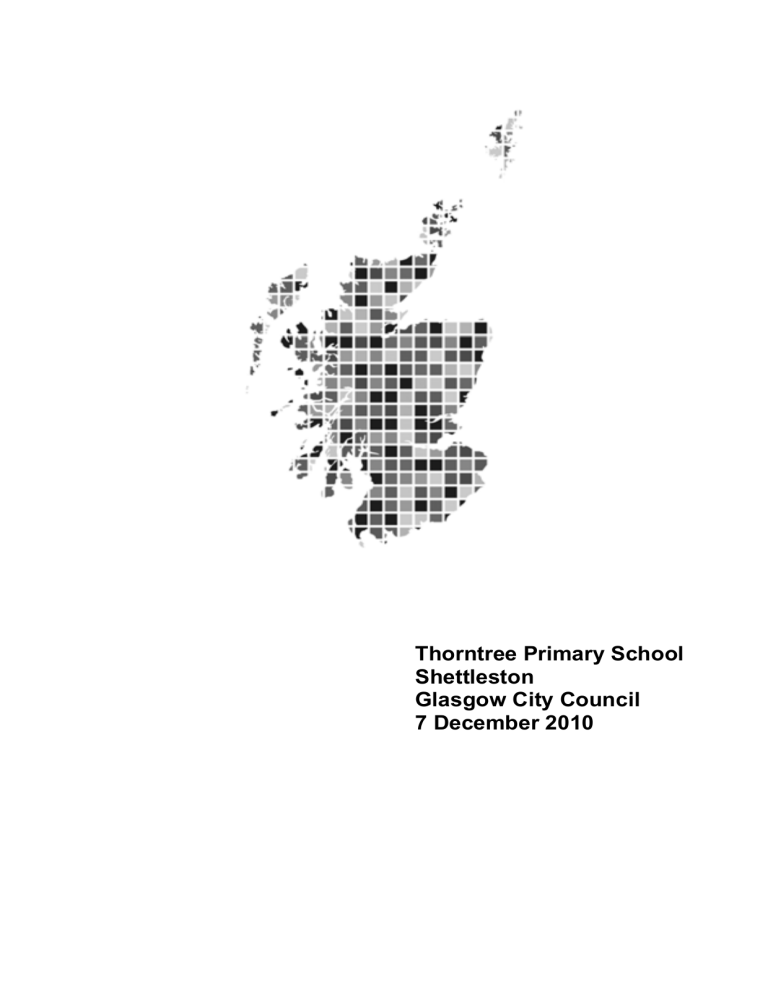
Thorntree Primary School
Shettleston
Glasgow City Council
7 December 2010
HM Inspectorate of Education (HMIE) inspects schools in order to let parents
1
, children and the local community know whether their school
2
provides a good education. Inspectors also discuss with school staff how they can improve the quality of education.
At the beginning of the inspection, we ask the headteacher and staff about the strengths of the school, what needs to improve, and how they know. We use the information they give us to help us plan what we are going to look at. During the inspection, we go into classes and join other activities in which children are involved. We also gather the views of children, parents, staff and members of the local community. We find their views very helpful and use them together with the other information we have collected to arrive at our view of the quality of education.
This report tells you what we found during the inspection and the quality of education in the school. We describe how well children are doing, how good the school is at helping them to learn and how well it cares for them. We comment on how well staff, parents and children work together and how they go about improving the school. We also comment on how well the school works with other groups in the community, including services which support children. Finally, we focus on how well the school is led and how staff help the school achieve its aims.
If you would like to learn more about our inspection of the school, please visit www.hmie.gov.uk. Here you can find analyses of questionnaire returns from children, parents and staff. We will not provide questionnaire analyses where the numbers of returns are so small that they could identify individuals.
1
Throughout this report, the term ‘parents’ should be taken to include foster carers,
2 residential care staff and carers who are relatives or friends.
The term ‘school’ includes the nursery class or classes where appropriate.
Contents
1. The school
2. Particular strengths of the school
3. How well do children learn and achieve?
4. How well do staff work with others to support children’s learning?
5. Are staff and children actively involved in improving their school community?
6. Does the school have high expectations of all children?
7. Does the school have a clear sense of direction?
8. What happens next?
1. The school
Thorntree Primary School is a non-denominational school. It serves the Shettleston, Greenfield and Springboig areas of Glasgow. The roll was 388 when the inspection was carried out in October 2010.
Children’s attendance was below the national average in 2008/2009.
1
2. Particular strengths of the school
•
Confident, respectful children who are enthusiastic about learning.
•
Children’s achievement in reading, writing and mathematics.
•
The school’s approaches to meeting children’s individual needs.
•
Staff who create a supportive and nurturing environment for children to learn.
•
High-quality relationships with parents and the local community.
•
The commitment of promoted staff and their leadership in taking forward school improvements.
3.
How well do children learn and achieve?
Learning and achievement
Across the school, children are very well motivated and engaged in their learning. They are proud of their school and their achievements.
Children feel safe and happy in school and can describe the ways they are supported. Across the school, most children are engaged in active, purposeful learning. Staff recognise the need to continue and extend this approach. Children are aware of their strengths as learners. Children are developing very good citizenship and enterprise skills through their involvement in, for example, delivering food parcels to the local community and success in the local ‘Burns’ competition.
Children at P7 develop their social and emotional skills through an annual residential visit to Castle Toward, whilst those at P6 last year enjoyed an exchange visit to Ireland which helped promote understanding of different lifestyles and communities.
2
Across the school, children achieve very well in a variety of subjects.
In health and wellbeing, children are able to talk about their thoughts, feelings and opinions on a variety of issues. They are developing a very good awareness of what they need to do to stay healthy and can describe how the school supports them to make positive health choices. In music, children are developing confidence and skills in creating rhythms, playing percussion instruments and reading simple musical notation. Children are enhancing their learning and skills through the use of information and communications technology (ICT).
For example, at P6, they are confident when designing animated presentations on the computer to advertise products.
Children achieve high levels of performance in reading, writing and mathematics, with most achieving appropriate national standards. A significant number reach standards earlier than would normally be expected. In language, children are making very good progress.
Almost all children listen well to the teacher and each other and most are developing good discussion and presentation skills. Children’s language skills are developing well through the use of a recently-introduced approach to reading in the form of a class novel study. For example, children at P4 are able to skim and scan texts for information and talk confidently about features of books such as character and plot. Children write well for a variety of purposes across the curriculum. By the senior stages, pupils are able to use grammar effectively to improve the quality of their writing. For a few children across the school, standards in writing could be higher still. Overall, children achieve very good levels of attainment in mathematics. At the early stages, children can work confidently with shapes and patterns.
Children in the nurture class are aware of the sequence of routines and events in their world. Children at P6 can use information they gather in spreadsheets to present information in the form of graphs. At all stages, children’s problem solving skills are developing well.
3
Curriculum and meeting learning needs
Staff have made a very good start to implementing Curriculum for
Excellence . Teachers make learning more relevant and help children make connections across different subject areas. At all stages, children benefit from well-planned literacy and numeracy activities across different subjects. For example, those at P2 were using sticks to make tally marks as part of their outdoor education experience.
Arrangements for teaching modern languages are currently under review and the school has identified this as a priority for improvement.
The school’s very good approach to health promotion teaches children about making healthy choices and the importance of a healthy lifestyle.
All children benefit from two hours of high-quality physical education each week. They learn about caring for the environment through
Eco-Schools Scotland activities and have been awarded a Green Flag for their efforts. The curriculum is enhanced through a wide variety of excursions and visitors to the school. Transitions between stages are very well managed and provide continuity of learning.
Across the school, staff know children very well and are sensitive to their learning and emotional needs. They make classrooms interesting and fun places to learn. Tasks and activities are at the right level of difficulty for almost all children. The school provides a wide range of measures designed to support individuals and their families, where appropriate. For example, play therapy and daily developmental physical education. The principal teacher coordinates support for children very well and ensures teachers, support staff and other agencies work effectively together. As a team, they provide high-quality support for children who are experiencing difficulties with their learning. Children who require individual learning targets are making very good progress. The school’s nurture class, known as
‘Glencoe’, supports the development of children’s social and emotional skills. It provides an outstanding level of support for a few younger children. These children benefit greatly from the sensitive care and encouragement they receive. This, in turn, helps them make progress in learning. Children across the school are set regular homework
4
tasks but these do not always provide enough consistency and challenge across the school.
4. How well do staff work with others to support children’s learning?
Parents support the work of the school. Staff keep parents very well informed about the work of the school and about their child’s progress.
The Parent Council is well established and supportive of the work of the school. The ‘Glencoe’ class has established particularly strong links with parents and carers who work well in partnership to support the needs of children. The Parent Teacher Association raises valuable funds which help provide additional resources and activities for the school. Very effective links have been made with the neighbouring denominational school and children have learned respect and tolerance through a joint project on anti-sectarianism. Staff from other agencies support children with additional learning needs well. There are sound procedures in place to deal with any complaints from parents and appropriate records are kept. Parents are consulted about sensitive health education issues. Very good arrangements are in place to support children moving from nursery to P1 and from P7 to
Eastbank Academy.
5. Are staff and children actively involved in improving their school community?
All staff are involved in improving the school and demonstrate high levels of commitment and professionalism. Relationships and teamwork are strong. Effective systems for tracking pupil progress and monitoring the work of classes ensure high standards are maintained. Children play a key role in improving the school and community. They value their roles as ‘Bully Busters’ and as members of the eco and health groups. The pupil council is well established and develops good ideas for taking the school forward. The nurture class
5
has recently gained the prestigious national Marjorie Boxall Award for work to support children.
6. Does the school have high expectations of all children?
Staff set high expectations of children’s behaviour and celebrate success through attractive displays around the school and through regular assemblies. The school has sound procedures in place to make sure children are happy and safe and children can name adults they can turn to for extra support. Staff are very confident in their knowledge of child protection procedures. The recent ‘Wonderful Life’ project celebrated the diversity of the families which make up the school community. All staff promote equality and fairness very well.
Children report that they feel valued and listened to. They like their school. Health promotion is well developed. The school’s very popular and well-attended breakfast club provides a healthy and happy start to the day. Children have a good understanding of the Christian faith and learn about other religions and cultures as part of their religious education programme. There are appropriate arrangements in place for religious observance.
7. Does the school have a clear sense of direction?
Staff parents and pupils have recently reviewed the school’s aims and values and reflects these well in its life and work. The headteacher has a clear vision for her school and sets the tone for the happy and supportive relationships that exist between staff and children. She recognises the strengths within her staff team and builds on these effectively to ensure school improvements are carried forward. The depute heads and principal teacher provide strong leadership and direction for staff. They carry out their demanding remits very well and set an excellent example as leaders of learning. All staff reflect regularly on their work and have the best interests of the learners at the heart of this. They should continue to build on their good practice
6
of sharing ideas and learning from each other. The school is very well placed to continue to improve.
8. What happens next?
As a result of the very good quality of education provided by the school, we will make no further visits in connection with this inspection.
The education authority will inform parents about the school's progress as part of the authority’s arrangements for reporting to parents on the quality of its schools.
We have agreed the following area for improvement with the school and education authority.
•
Continue to take forward Curriculum for Excellence .
7
Quality indicators help schools and nursery classes, education authorities and inspectors to judge what is good and what needs to be improved in the work of a school and a nursery class. You can find these quality indicators in the HMIE publications How good is our school? and The Child at the Centre . Following the inspection of each school, the Scottish Government gathers evaluations of three important quality indicators to keep track of how well all Scottish schools and nursery classes are doing.
Here are the evaluations for Thorntree Primary School.
Improvements in performance
Learners’ experiences very good very good
Meeting learning needs very good
We also evaluated the following aspects of the work of the school.
The curriculum very good
HM Inspector: Carole McKenzie
7 December 2010
8
When we write reports, we use the following word scale so that our readers can see clearly what our judgments mean. excellent very good good means means means outstanding, sector leading major strengths important strengths with some areas satisfactory means strengths just outweigh weaknesses unsatisfactory means major weaknesses
If you would like to find out more about our inspections or get an electronic copy of this report, please go to www.hmie.gov.uk.
Please contact us if you want to know how to get the report in a different format, for example, in a translation, or if you wish to comment about any aspect of our inspections. You can contact us at HMIEenquiries@hmie.gsi.gov.uk or write to us at BMCT,
HM Inspectorate of Education, Denholm House, Almondvale Business
Park, Almondvale Way, Livingston EH54 6GA.
Text phone users can contact us on 01506 600 236. This is a service for deaf users. Please do not use this number for voice calls as the line will not connect you to a member of staff.
You can find our complaints procedure on our website www.hmie.gov.uk or alternatively you can contact our Complaints
Manager, at the address above or by telephoning 01506 600259.
Where the school has a nursery class, you can contact the Complaints
Coordinator, Headquarters, Care Commission, Compass House,
Riverside Drive, Dundee DD1 4NY, telephone 0845 603 0890.
Crown Copyright 2010
HM Inspectorate of Education
